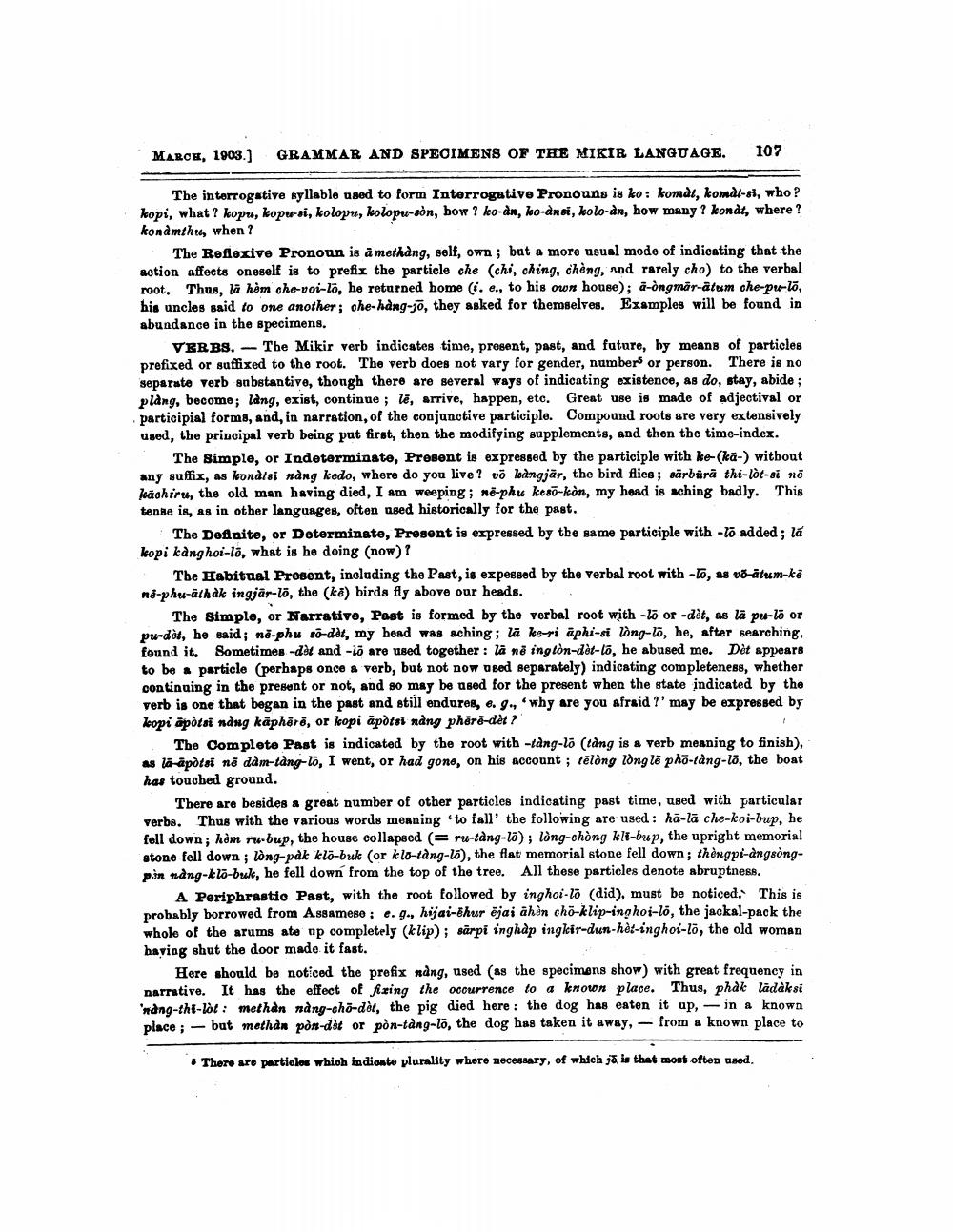________________
MARCE, 1903.) GRAMMAR AND SPECIMENS OF THE MIKIR LANGUAGE.
107
The interrogative syllable used to form Interrogative Pronouns is ko : komat, komat-ol, who? kopi, what ? kopu, kopu-si, kolopu, kolopu-son, bow? ko-da, ko-ansi, kolo-dx, how many ? londt, where? kondmthes, when ?
The Reflexive Pronoun is a methang, self, own; but a more usual mode of indicating that the action affects oneself is to prefix the particle che (chi, ching, chòng, and rarely cho) to the verbal root. Thus, là hòm che-voi-lo, he returned home i. e., to his own house); a-òngmär-atum che-pu-lo, his uncles said to one another; che-hàng-jo, they asked for themselves. Examples will be found in abundance in the specimens.
VERBS. -The Mikir verb indicates time, present, past, and future, by means of particles prefixed or suffixed to the root. The verb does not vary for gender, number or person. There is no separate verb substantive, though there are several ways of indicating existence, as do, stay, abide ; plang, become; lang, exist, continue ; lē, arrive, happen, etc. Great use is made of adjectival or participial forms, and, in narration, of the conjunctive participle. Compound roots are very extensively used, the principal verb being put first, then the modifying supplements, and then the time-index.
The Simple, or Indeterminate, Present is expressed by the participle with ke-(ka-) without any suffix, as kondisi nang kedo, where do you live? vo kangjār, the bird flies; sărbüră thi-lot-si nē káchiru, the old man having died, I am weeping; ne-phu keső-kön, my head is aching badly. This tense is, as in other languages, often used historically for the past.
The Definite, or Determinate, Present is expressed by the same participle with - To added ; la kopi kang hoi-lo, what is he doing (now)?
The Habitual Present, including the Past, is expessed by the verbal root with - To, as vo-atum-ka no-phu-athak ingjar-lo, the (ka) birds fly above our heads.
The Simple, or Narrative, Past is formed by the verbal root with -lö or -ddt, as lä pu-lo or pu-dot, he said; no-phu 5-ddt, my head was aching; tā ke-ri aphi-si lòng-lo, he, after searching, found it. Sometimes -det and -lo are used together : la nē ington-dot-lo, he abused me. Dèt appears to be a particle (porhaps once a verb, but not now used separately) indicating completeness, whether continuing in the present or not, and so may be used for the present when the state indicated by the verb is one that began in the past and still endures, e. 9., 'why are you afraid ?' may be expressed by kopi apòtsi ndug kāphörő, or kopi apdtsi nang phäro-det?
The Complete Past is indicated by the root with -tang-lo (tang is a verb meaning to finish), as la apòtsi në dam-tang-lo, I went, or had gone, on his account ; tēlòng lòng lo pho-tang-lo, the boat has touched ground.
There are besides a great number of other particles indicating past time, used with particular verbs. Thus with the various words meaning to fall' the following are used : hă-lä сhe-koi-bup, he fell down; hòm ro-bup, the house collapsed (= ru-tang-lo); lòng-chòng kit-bup, the upright memorial stone fell down ; lòng-pak klo-bruke (or klo-tang-15), the flat memorial stone fell down; thèngpi-angsòngpin nang-klo-brale, he fell down from the top of the tree. All these particles denote abruptness.
A Periphrastio Past, with the root followed by inghoi-lo (did), must be noticed. This is probably borrowed from Assamese ; e. g., hijai-hur ējai khèn chö-klip-inghoi-lo, the jackal-pack the whole of the arums ate np completely (klip); särpi inghap ingkir-dun-hòr-inghoi-lo, the old woman having shut the door made it fast.
Here should be noticed the prefix nàng, used as the specimens show) with great frequency in narrative. It has the effect of fixing the occurrence to a known place. Thus, phak ladak si ndng-thi-lot: methàn nàng-chö-dot, the pig died here : the dog has eaten it up, in a known place; - but methan pòn-dàt or pon-tang-lo, the dog has taken it away, - from a known place to
• There are partiolos whioh indionte plurality where necessary, of which jd is that most often used.




